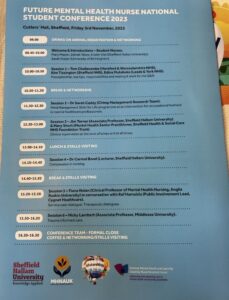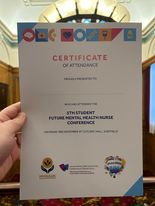By Shannon O’Rourke, 3rd year, BSc Nursing Studies (Mental Health)
As a student mental health nurse, it is always good to meet other student nurses, and what better way than attending the Student Future Mental Health Nursing Conference in Sheffield (@FutureMHN_Conf). Fortunately, Glasgow Caledonian University funded for myself and another student nurse to attend. This annual event held on November 3rd 2023 brought together students who were studying mental health nursing from across the UK. The event is a student-led conference with speakers from different areas such as clinical practitioners, academics, mental health service users.
The event topics included: preceptorship, mind management skills, clinical supervision, compassion in nursing, and therapeutic dialogues with a service user. There was a running theme of preventing burnout, which is very topical. Throughout the day there were breaks and opportunities to network with like-minded peers and NHS organisations to discuss job opportunities.
I feel I learned a great deal regarding mental health nursing and, even more than that I feel this opportunity allowed me to reflect on what kind of nurse I aspire to become. I learned how to make the most of preceptorship, and why is it essential to help develop my nursing skills. Preceptorship gives newly qualified practitioners extra support as they start their journey as a registered nurse. This allowed me to reflect on the interviews I have in the coming months, being able to ask potential employers what support is in place, and interview tips for interviews, I want to know about paths for progression and it would never have occurred to me to use the interview as time to sell yourself for the position but also to allow potential employers to showcase why you should go work with them. I had been able to further reflect on my own reactions as I listened to the talk on ‘The chimp, the computer and the human’. from the mind management speaker. A simplified visual representation to help individuals understand their reactions. My ‘chimp’ is my reactive form, my ‘fight or flight’ response and I can react with my chimp, or I can respond with my human and more logical part of the brain. I was able to take away some useful knowledge to reflect on my reactions and I believe this shift in your mindset can promote resilience which is essential in nursing.
Clinical supervision was something I hadn’t given much thought to however, after the conference I have been able to see the real value in it preventing burn out by allowing staff to voice issues in a confidential and safe environment and to work through challenges. Dealing with emotional challenges within mental health nursing helps develop knowledge and empowers the individuals thus, building self-esteem. Overall, realizing that this can make me perform better, meaning I can give my patients the best of myself, this all has a positive effect on the quality of care patients receive. Nurses within forensic mental health settings described the environment as emotional, traumatic, intense, and stressful and found clinical supervision helpful1. Although the evidence highlights how important clinical supervision has been as a supportive base for nurses’, there is still persistent barriers to implementing this within a workplace2. An issue which provokes worry for those like myself who is due to qualify soon.
I reflected upon my university interview, being asked what six Cs I view as most important, although they are all equally as important. I picked compassion as that was my driving force to come into this career path. At the conference, there was a quote “compassion is who we are as an individual and how we respond to other people’s suffering. ‘Suffering’ is a term I’m not sure about, however, the word is hard hitting and allowed me to reflect. There are limited number of studies which explore how compassion is taught to student nurses3 and how I try to be compassionate to all patients and individuals I meet. Compassion is essential within nursing.
The last talk was very thought-provoking from an individual who is an expert in lived experience and came to discuss therapeutic relationships. He emphasized compassion and understanding how everyone’s recovery is different. This was important for me to hear; I think people in nursing can set themselves an unrealistic goal to try and make everyone 100% better – almost a need to ‘fix’ people. There is room within nursing to discuss this more, starting from day 1 at university. As recovery for everyone is different we need to have goals that fit within someone’s individual recovery journey. Hearing from someone who has been a patient, how nurses can come across as robotic made me realise how we need to humanize ourselves, allowing us to build a stronger therapeutic relationship with those we care for. If a patient is reacting with ‘their chimp’, it’s important for us not to mirror the reaction, but instead our ‘human’ must react. This talk encouraged discussion, and whilst there were no definite answers I feel all within the room including myself thought and reflected on our practice. This talk highlighted how burnout can have a negative impact on patients and how we can help work in partnership with patients with the aim for the least restrictive practice and advocate for patients.
I would recommend other students to attend this event in the future as I found this very beneficial to my learning. Overall, I feel the day left me with more questions than answers, which is a good thing!. I feel one way to be a successful nurse is to always question things, how can we improve, and what can we do differently. Leaving with questions on how I can make myself the best practitioner possible to deliver the best care possible for patients. One speaker said, “mental health nurses step into spaces others step back from”, a quote which will stay with me for a long time.
References
- Newman, C., Eason, M. and Kinghorn, G. (2023) ‘Forensic Mental Health Nurses’ Experiences of Clinical Supervision’, Journal of Forensic Nursing, 19(1), pp. 12-20.
- Masamha, R., Alfred, L., Harris, R., Basset, S., Burden, S. and Gilmore, A. (2022) ‘‘Barriers to overcoming the barriers’: A scoping review exploring 30 years of clinical supervision literature’, Journal of Advanced Nursing, 78(9), pp.2678-2692.
- Durkin, M., Gurbutt, R. and Carson, J. (2018) ‘Qualities, teaching, and measurement of compassion in nursing: A systematic review’, Nurse Education Today, 63(4), pp. 50-58. Available at: https://doi.org/10.1016/j.nedt.2018.01.025

